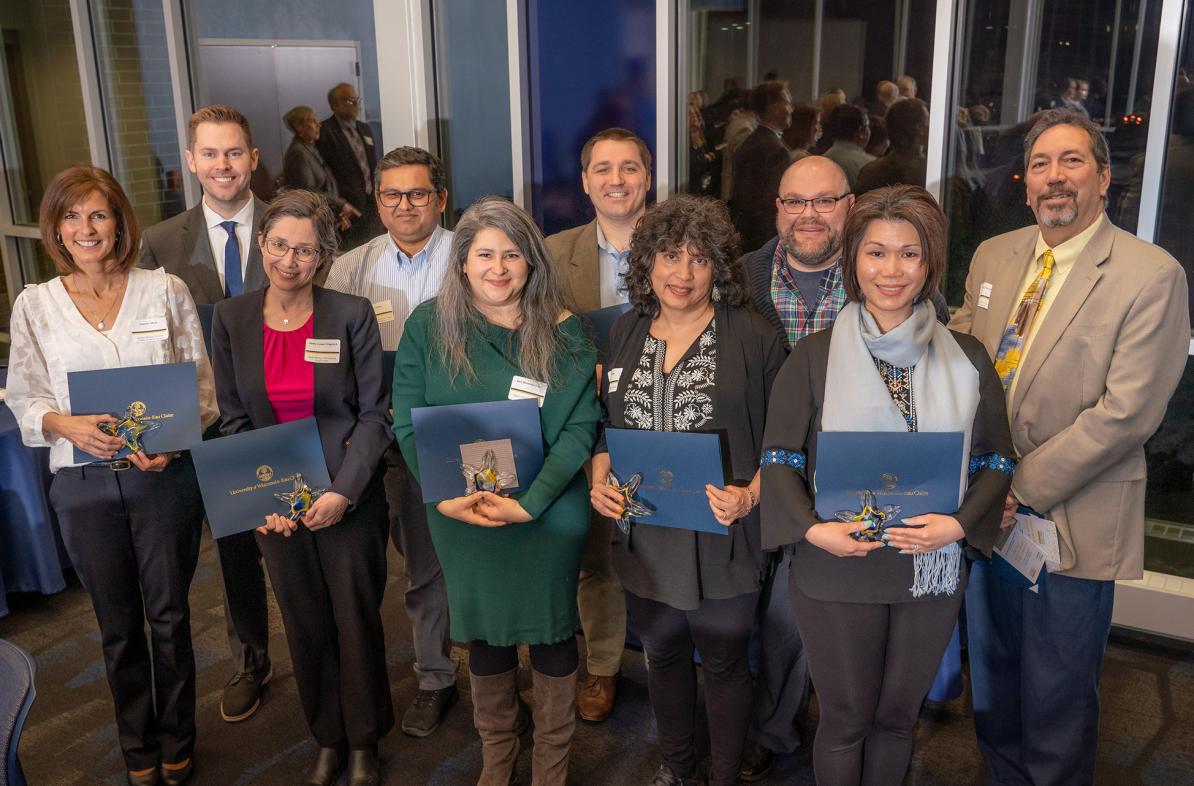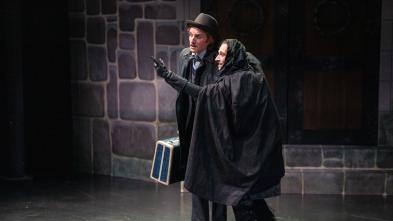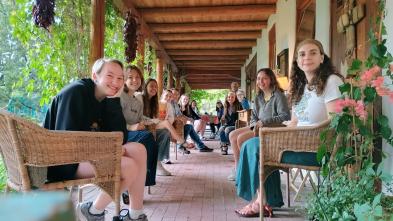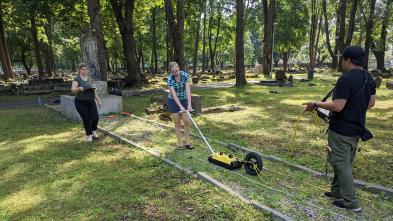
New University Fellows program rewards high-achieving faculty
The University of Wisconsin-Eau Claire has named 10 educators as University Fellows, a new donor-supported initiative that aims to recognize and celebrate high-achieving members of the university’s faculty and instructional staff.
“Every day, our incredible faculty engage with students in ways that make a real difference in their lives during and after college,” says Julia Diggins, interim president of the UW-Eau Claire Foundation. “We want to reward them for their wonderful work, so they know they are appreciated and valued.”
The hope, Diggins says, is that the fellowship awards will encourage talented faculty at all stages of their academic careers to stay at UW-Eau Claire and to pursue initiatives that will benefit current and future students.
Faculty recruitment and retention have long been at the “top of the list” of Foundation initiatives, a priority shared by many alumni and friends of UW-Eau Claire, Diggins says. With donor support, the Foundation established 10 distinct multiyear University Fellowships.
Nine University Fellows will work on a project of their choice over a period of three to five years, with $10,000 or $12,500 per year in award funds paying for course overloads or a course release. One fellowship awards the recipient $5,000 for one year.
“They might use the fellowship funds for research or to create a new course or to rewrite curriculum for an existing class,” Diggins says. “They choose the area they want to focus on, and this award gives them more money or time to do it.”
Alumni donors Debra and Aroon Maben, who met on campus as students, credit faculty with preparing Aroon Maben to successfully launch his career in international business. They hope the fellowship they are funding will reward a faculty member who is doing extraordinary work for students.
“We believe that by investing in faculty, we can best contribute to UW-Eau Claire’s tradition of excellence in the development of both its faculty and of its students,” the Mabens say.
A program like this is only possible because of people like the Mabens, “committed donors who believe in our campus and our faculty,” says Dr. Sonja Meiers, professor of nursing and former interim dean of the College of Nursing and Health Sciences. The campus is “thankful for their gifts so we can recognize these outstanding colleagues,” she says.
The program breaks the awards into three categories — early-, mid- and late-career, so faculty at every stage of their careers are eligible. Some donors elected to focus their dollars on specific academic areas, while others left their award open to any outstanding member of the faculty. Interested faculty submitted project proposals, and a committee of college deans selected the recipients.
“The caliber of work represented not only by the award recipients but by all the applicants is a testament to the outstanding faculty we have on our campus,” says Dr. Carmen Manning, dean of the College of Education and Human Sciences. “It was clear from each application that our faculty approach every aspect of their teaching, research, creative activity and service with curiosity, joy and excitement.”
Although every fellow is in a different place in their career, they all demonstrated a similar set of values, says Dr. Aleks Sternfeld-Dunn, dean of the College of Arts and Sciences. They all share a “commitment to the highest quality teaching, dedication to their research and creative activity, a desire to serve our campus, and an understanding that our institution is best served when we strive to make sure that all members of our campus and broader community are treated equitably,” he says.
The University Fellows program is critical to supporting and retaining UW-Eau Claire’s outstanding faculty, says Dr. Brewer Doran, dean of the College of Business. In the university’s classrooms, labs and clinics, “we have leaders in the field who are not only dedicated to their research but to our students and our UWEC community,” Doran says.
UW-Eau Claire introduced the 10 inaugural University Fellows during an event Feb. 16. The 2023-24 University Fellows are:
Dr. Kati Barahona-López, assistant professor of sociology
Barahona-López received the Bartelt Early Career Fellow award, a three-year award of $12,500 available to a faculty member in any department or college.
An accomplished researcher, teacher and author whose research primarily focuses on youth, Barahona-López has published articles on young people in systems of incarceration and articles about the way the pandemic period affected people’s mental health.
“My research seeks to examine specific social cases to help our society think about our expectations and yearnings for the social world,” Barahona-López says in her proposal. “For this reason, my research seeks to reexamine cases of young people entangled with the law to decipher the social forces at play.”
Barahona-López will use the award for course release so she can work on publishing her solo and co-authored work and complete a book manuscript. She plans to “infuse her scholarship into her teaching” by using the experiences of youth to enrich classroom discussion and help students connect with course content.
Barahona-López’s research and teaching demonstrate an “impressive depth and breadth of knowledge of sociological topics related to the law, immigration, youth and the criminal justice system,” Dr. Ari S. Anand, associate professor of geography and anthropology, women’s studies and American Indian studies, says in his letter of support. Her teaching, he says, “shows a commitment to serving students of color and first-generation students by engaging in class content and assignments that allow students to think about their experiences as central to the study of sociology.”
Dr. Daniel Gullifor, assistant professor of management and marketing
Gullifor is the recipient of the Tyler Patterson College of Business Early Career Fellow award, a three-year award of $12,500 available to a faculty member in the College of Business.
A respected teacher and accomplished scholar, Gullifor has had multiple articles published in top journals as well as book chapters and case studies. His publication successes have “raised my profile and that of UWEC and elevated my reputation as a leading researcher internationally on the impostor phenomenon,” Gullifor says, noting that he was recently invited to present along with other top scholars at an impostor phenomenon symposium.
Gullifor has achieved great success in the early stages of his academic career, Dr. Scott Lester, professor of management, says in his letter of recommendation. “He has shown himself to be a dedicated teacher and advocate for students, a highly skilled researcher and an outstanding colleague,” Lester says.
While he enjoys teaching, Gullifor says his student-faculty research collaboration relating to impostor phenomenon is what “energizes” him most. “The ability to collaborate with other faculty and students has been incredibly rewarding and one of the most impactful projects I’ve led,” Gullifor says.
He says the fellowship is an opportunity to “build on the foundation I have worked diligently to establish.” With the award, he’ll continue to develop as a teacher, with a goal of preparing his students to become effective leaders capable of conquering the new challenges facing organizations today. He also will use it to advance his research agenda, particularly his collaborations with students, he says.
Dr. Jamie Lyman Gingerich, associate professor of biology
Lyman Gingerich received the Bartelt Biology Mid-Career or Senior Fellow award, a five-year award of $12,500, available for a faculty member in the biology department.
A dedicated teacher, researcher and mentor, Lyman Gingerich says she’s “committed to training the next generation of problem-solvers and leaders as well as contributing scientific knowledge.”
In her proposal, Lyman Gingerich says the fellowship award will “provide the resources and time for me to continue building an effective research experience for students, network with health system partners like Mayo Clinic and Wisconsin companies like PreventionGenetics, and further develop as a leader within the university and scientific communities.”
Lyman Gingerich’s influence “reaches beyond the department and university,” Dr. Tali Lee, professor of biology, says in her letter of support. Lyman Gingrich has helped grow undergraduate research on campus, was integral to the university establishing a research collaboration with Mayo Clinic, and is involved in teaching-related efforts that extend to pre-K through grade 12 science education in the community, Lee says.
Lyman Gingerich is “one of our leaders in helping our institution meet its goal of transformative learning experiences for students,” Lee says.
Dr. Scott Swanson, professor of management and marketing
Swanson is the recipient of the College of Business Faculty Excellence Fellow award, a five-year award of $10,000 available to a faculty member in the College of Business.
A productive researcher, Swanson has more than 120 refereed publications, 38 grants and 11 conference best paper awards. He has also worked with 33 undergraduate students on 21 distinct student-faculty collaborative research projects, with results shared regionally, nationally and internationally.
Swanson’s research focuses on environmentally responsible behavior and social responsibility, as well as “service recovery” strategies in the hospitality and tourism industries. Earlier projects addressed marketing issues related to the performing arts and sports.
“I genuinely believe that the research and scholarly activities I pursue relate to and enhance my teaching and, thus, benefit my students,” Swanson says. “Being current with knowledge development in the field allows me to share new insights with students, while currency of pedagogy research aids in my ability of how best to deliver those insights.”
Swanson’s many interactions with students, younger colleagues and the community is impressive, Dr. Kristy Lauver, professor and chair of the management and marketing department, says in her letter of support. For example, he includes students on consulting projects for community members, giving them an “invaluable experience,” while also doing a great service to the community, she says. Swanson also advises the UW-Eau Claire American Marketing Association Collegiate Chapter, which has been recognized as the top student chapter in North America five of the past seven years.
Dr. Kaia Simon, associate professor of English and race, ethnicity, gender and sexuality studies, and director of the Blugold Seminar Writing Program
Simon is the recipient of the Debra Maben University Mid-Career Fellow award, a five-year award of $12,500 available to a faculty member in the humanities or arts.
A successful teacher and scholar, Simon is a leader within her department, on campus, within the UW System and within her field on a national level. In addition to her teaching and research, she also serves as director of UW-Eau Claire’s Blugold Seminar Writing Program.
“Dr. Simon has compiled an outstanding record of achievement in scholarly and creative work that is recognized regionally and nationally,” says Dr. Erica Benson, professor of English and interim director of the Office of Research and Sponsored Programs.
Equity, diversity and inclusion are priorities in her teaching and research, Simon says. She’s published two peer-reviewed articles in top-tier journals that draw from her research on Hmong women and literacy, and has co-led two domestic immersion trips to Fresno, California, to learn about the Hmong community there.
She will use her fellowship award to continue her research on peer response in Blugold Seminar Writing classrooms and to develop professional development for her colleagues, Simon says. Her goal is that the university’s writing program “continues its history of excellence in developing students’ skills in rhetoric and critical literacies but with specific attention to EDI and to student retention,” Simon says.
Dr. Asha Sen, professor of English
Sen is the recipient of the Grace Lau Mid-Career University Fellowship, a five-year award of $10,000 available to a mid- or senior-level faculty member in any department or college.
An accomplished teacher, author and scholar, Sen has “demonstrated a high level of professional excellence,” says Dr. Rose-Marie Avin, professor of Latin American and Latinx studies and chair of the department of race, ethnicity, gender and sexuality studies.
Sen has established community partnerships that bring students and area nonprofits together. She also took students to India to study the history of feminist publishing. That led to a UW-Eau Claire exchange program with a college there, a collaboration that is “ongoing and continues to foster intellectual inquiry around feminist concerns and bring significant prestige to both universities,” Sen says.
“She teaches classes on campus and abroad for UWEC students and her unique approach to international education includes the design and proposal of various international research opportunities for UWEC students,” Avin says.
A well-known scholar in the U.S. and one of the foremost postcolonial academics in the world, Sen has been invited to make presentations all over the globe. The fellowship award will offer release time, allowing her to complete her current scholarly projects and further contribute to the university’s EDI goals.
Dr. Nga-Wing Anjela Wong (she/they), associate professor of education for equity and justice
Wong is the recipient of the Shirley Paulson-Lee Education University Fellow award, a five-year award of $12,500 available for a faculty member in the College of Education and Human Sciences.
At UW-Eau Claire, Wong advances EDI and justice initiatives through teaching, scholarship and service. Mentoring also is a priority, says Wong, who mentored junior colleagues and more than 30 student researchers, the majority first-generation college students, BIPOC and from marginalized identities. Wong co-advises the Hmong Students Association and has mentored more than 100 Hmoob American students.
Wong works with first-generation and BIPOC students in multiple ways, so those students “see themselves represented on campus and feel supported in their quest for a degree,” says Dr. Sue Fondrie, professor of EEJ and chair of the department. Wong also regularly engages in student-faculty collaborative research on topics with an equity focus, “both mentoring students and advancing the conversation where equity is concerned,” Fondrie says.
“As a first-generation college student, much of my success has been facilitated by phenomenal mentorship,” Wong says. “As someone who has benefited from exemplary mentorship, I value the importance of mentoring others and the joy that result from it.”
The fellows award will advance Wong’s current work to develop and sustain a high-quality infrastructure to support collegewide equity and justice initiatives. Wong’s plans include helping colleagues recognize that everyone has a role to play in the implementation of equitable practices that dismantle oppression and work toward justice; dismantling barriers for BIPOC and other marginalized students and building education pathways where they can thrive; and building and sustaining authentic relationships and partnerships with BIPOC communities in Wisconsin. For instance, in 2018, Wong founded the Southeast Asian American Educational Partnerships (SEAAEP), an educational pipeline that creates partnerships and mentorship opportunities that work toward justice.
Dr. Josh Brown, professor of languages
Brown received the Raymond and Tamara Skwierczynski University Fellow in Languages award, a three-year award of $12,500 available for a faculty member in the languages department.
A leading expert on heritage languages and a heritage language speaker himself, Brown says UW-Eau Claire is well positioned to work with marginalized students at risk for extreme academic barriers, most especially heritage language students. Heritage language students are challenged with many issues academically, he says.
With the fellowship, Brown will lay the groundwork for creating a Center for Heritage Language Studies. UW-Eau Claire is “uniquely positioned” to become a campus where “heritage language speakers can find academic opportunities instead of barriers,” he says.
“In creating a Center for Heritage Language Studies on campus, we’ll be able to look at all these aspects — everything from language change between generations to figuring out the needs of heritage language students at universities to cultural understanding,” Brown says.
In a letter supporting Brown’s fellowship application, Dr. Joseph Salmons, professor of language sciences at UW-Madison, says Eau Claire is “extremely well located in terms of a diverse set of heritage languages” and the campus is “remarkably well poised to become a place for students with heritage language backgrounds, a woefully underserved population throughout the UW System. We need that leadership, and I and other faculty at Madison would be delighted to see UWEC take that role.”
Dr. Jeanette Olsen, associate professor of nursing
Olsen has been awarded the Suzanne Strowig University Faculty Award in Nursing award, a five-year award of $12,500 available for a faculty member in the College of Nursing and Health Sciences.
Olsen’s nursing practice started in acute care medical-surgical nursing. However, starting with her doctoral dissertation, many of her scholarly projects have involved nursing informatics, a recognized nursing specialty area. Nursing informatics is an “important and expanding” field that needs to be strengthened in the Master of Science in nursing program, Dr. Dalete Mota, associate professor of nursing, says in her letter of support.
Olsen will use the fellowship monies to strengthen her expertise and teaching and scholarly contributions in the area of nursing informatics. This will include increasing her informatics knowledge and learning innovative methods for analyzing big data. She’s not aware of anyone else in the College of Nursing and Health Sciences who is using big data for research, so it’s her hope her fellowship activities would “expand knowledge and skills among our faculty, too,” Olsen says.
“Nursing informatics is an area in which my scholarly experience and the needs of the department intersect,” Olsen says. “Earning a post-master’s certificate in nursing informatics, gaining practice experience in this area and engaging in ongoing scholarship on this topic will position me to help strengthen our curricula by integrating contemporary, innovative information and applications in courses.”
It also will position her to engage in more faculty-student collaborative research to further enhance graduates’ competence in this area and to contribute to nursing knowledge development, Olsen says.
Bob Duerst, lecturer of biology
Duerst was awarded the Lohse-Fischman Faculty Excellence in Biology Award, a one-year $5,000 award for faculty or instructional staff in any academic field.
Duerst’s contributions to the curriculum and to the biology department have made a “significant impact on the education of future health care and education professionals,” Dr. Derek Gingerich, associate professor of biology, and Dr. Jamie Lyman Gingerich state in a letter of support.
“He continually seeks ways to improve the curriculum of the anatomy and physiology courses, engage students as they navigate their university experience and support the biology department,” his colleagues say.
Duerst encourages students to take on leadership and peer mentoring roles in and out of the classroom. As the advisor for biology education majors, Duerst facilitates student progression through the program but also creates customized course experiences for students, including having students play a more integral role in lab preparation and creating science-themed presentations for local elementary schools.
“He is a person who effectively identifies a need, crafts a plan to address that need, puts that plan into action and then sustains the new approach,” Duerst’s supporters say. “Given his track record, we believe that he would use the funds from this award in a way that would significantly benefit students, the department and himself.”
You may also like


